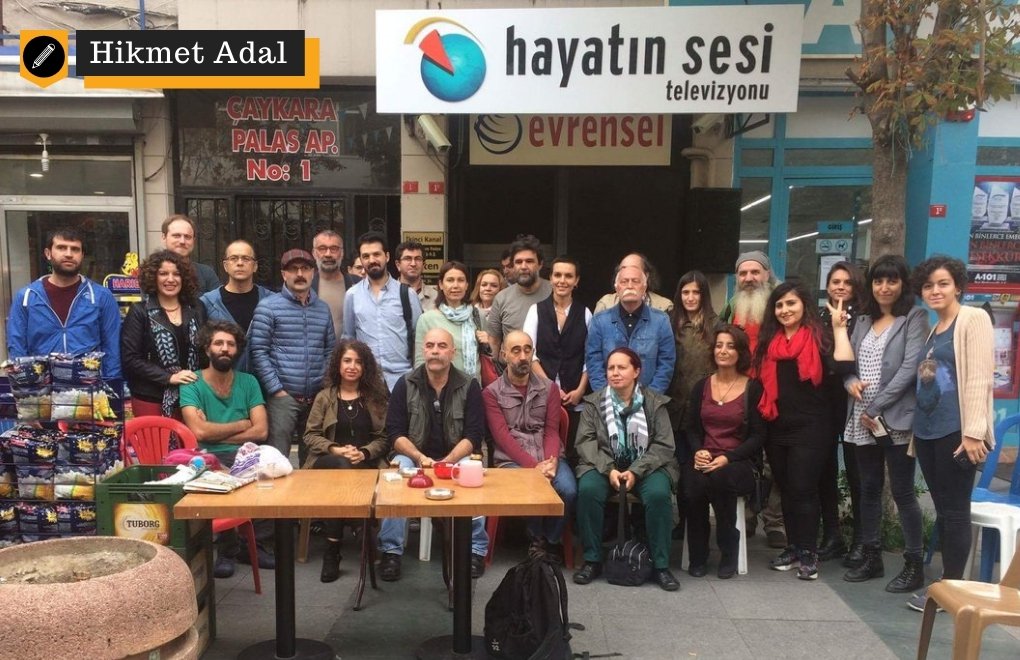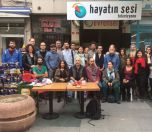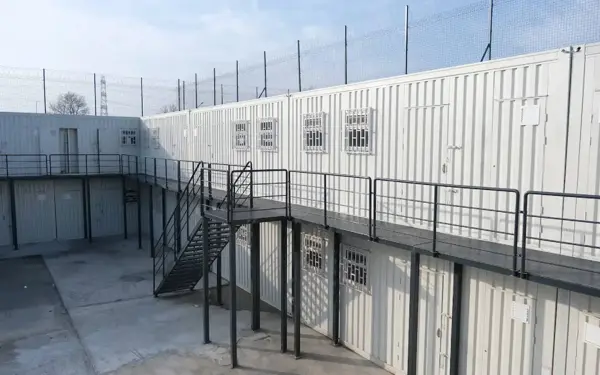Click to read the article in Turkish
The Constitutional Court on April 8 repealed a statutory decree article that provided legal base for closures of media outlets on the ground of "posing a threat to national security."
Not only repealing article 2/4 of Statutory Decree no. 6755, but the top court also reversed a provision that paved the way for the seizure of the properties that were shut down.
During the state of emergency declared following the coup attempt on July 15, 2016, some 204 media outlets and distribution companies —six news agencies, 70 newspapers, 20 magazines, 41 radio stations, 38 TV channels and 29 publishing houses— were closed down by nine statutory decrees.
While some of the closure decisions have been reversed, 179 media outlets, including the Kurdish media and outlets tied to the "Fetullahist Terrorist Organization (FETÖ)" are still closed.
We have talked with Devrim Avcı, an attorney of Hayatın Sesi TV, Eyüp Burç, the coordinator of İMC TV and Erol Önderoğlu, the Reporters Without Borders (RSF) representative to Turkey.
"We won't let go of the legal processes"
Eyüp Burç said, "We had been broadcasting since May 1, 2011, and we were removed from the TÜRKSAT satellite on February 26, 2016. And we were closed down by a statutory decree after the coup attempt.
"From the very beginning, our attorneys objected to the closure on solid grounds. Our claim was that we were not closed down by a statutory decree but by the discretion of the political administration. Because we were shut down by a commission affiliated with the Prime Ministry. This was planned at the time.
"In the first wave of statutory decrees, they closed down the 'FETÖ media outlets.' In the second wave, they turned onto the democratic Kurdish press.
"We have taken this decision to the administrative court. At this stage, nine hearings have been held. Meanwhile, we have also applied to the European Court of Human Rights. Stating that domestic legal remedies were not exhausted, the ECtHR said, 'Come back later.' The reason for this was the establishment of the statutory decree commission.
"After the statutory decree commission was established, the administrative court referred us to the commission. We made an appeal at the commission. They told us to go to the court. We have been struggling in a cycle like this for five years.
"But now, a favorable verdict has been given by the Constitutional Court. We hope that this verdict will cause the case to drop in favor of us. We want to broadcast again. Of course, we want compensation for our losses as well. If this doesn't happen, the way to the ECtHR is open now. We have been away from broadcast life for five years. Our properties were handed over to TRT [state broadcaster].
"In a state of law, our rights should be reinstated after the Constitutional Court decision. But Turkey is not a state of law. We have seen before that Constitutional Court verdicts were not implemented. We won't let go of legal processes until our losses are compensated and justice is served."
"The ruling is ambiguous"
Avcı said, "Hayatın Sesi TV started broadcasting on March 21, 2007. It was closed down on September 29, 2016, with a state of emergency statutory decree being cited. The ruling given by the Constitutional Court is very favorable but the text of the ruling is a bit ambiguous. The state of emergency period and the period after the state of emergency were evaluated separately, there is a contradiction.
"In the decision, the Constitutional Court says no newspapers or television channels can be closed by a committee decision outside of a state of emergency period, courts handle it. But the problem is practices in the state of emergency period.
"If there is no state of emergency, no one would close a newspaper or a television with a decree while there are courts in the country. We say that freedom of expression, freedom of the press shouldn't be restricted even during a state of emergency. Therefore, we will make applications, stating that the decision should include that period.
"Because freedom of expression is something that is most frequently being violated ... in Turkey. If your expressions are against the government, you are quickly accused of being a terrorist, a putschist or attempting to overthrow the government ... Freedom of expression exists for views that don't suit the majority but this is a freedom that is increasingly getting narrower in Turkey.
"Even if we were closed down during the state of emergency, the impact of this violation still continues. All the lawsuits we have filed so far have been rejected. We have an individual application pending at the Constitutional Court.
"With the judgment, we will make the required application to obtain our license. We will apply to the RTÜK [Radio and Television Supreme Council], TÜRKSAT, TMSF [Saving Deposit Insurance Fund] but it's unknown what we will face. The TMSF had put up our properties for sale. We will request the compensation of our losses."
"Important but too late"
RSF's Önderoğlu said that the Constitutional Court confirmed that the executive organ cannot take such heavy actions based on the state of emergency in a judgment that was "very important but too late."
"In the five years, many media outlets' broadcast licenses and properties were sold. For example, how will Hayatın Sesi TV, which was shut down upon a proposal by a commission established by the ministry and the approval of the minister, as stated in the Constitutional Court decision, will start broadcasting again?
"We said this in that period: the state of emergency and its statutory decrees were misused to get rid of the pluralistic media. It will be a surprise it will have its rights back and reopen in a period when the future of the Constitutional Court is discussed in the government circles.
"Such decisions tell governments that they cannot take advantage of the authorities given to them in extraordinary periods to get rid of media outlets that don't fall into line. In a state of law, the government's decisions should be based on a valid reason and proportional."
Media closures during the state of emergencyFollowing the coup attempt on July 15, 2016, a state of emergency was declared on July 20. It was extended twice and ended on July 19, 2018, during this period, 32 statutory decrees were issued by the government. During the first two months of the state of emergency, 620 press cards, 34 parliamentary press cards and passports of some journalists were canceled. With Statutory Decrees no. 668 (27.07.2016), 675 (29.10.2016), 677 (22.11.2016), 675 (29.10.2016), 670 (17.08.2016), 689 ( 29.04. 2017),693 (25.08.2017), 695 (24.12.2017) and 701 (08.07.2018), a total of 204 media outlets, including six news agencies, 70 newspapers, 20 magazines, 41 radio stations, 38 TV channels and 29 publishing houses, were closed down. The closure decisions regarding 25 media outlets, including 17 newspapers, four radio stations, four TV channels, were later reversed. Some 179 media outlets, including 53 TV channels, 37 radio stations, 20 magazines, six news agencies and 29 publishing houses are still closed. |
(HA/VK)












